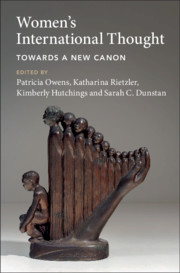Book contents
- Women’s International Thought: Towards a New Canon
- Women’s International Thought: Towards a New Canon
- Copyright page
- Contents
- Preface and Acknowledgments
- Introduction
- 1 Field and Discipline
- 2 Geopolitics and War
- 3 Imperialism
- 4 Anticolonialism
- 5 International Law and International Organization
- 6 Diplomacy and Foreign Policy
- 7 World Peace
- 8 World Economy
- 9 Men, Women, and Gender
- 10 Public Opinion and Education
- 11 Population, Nation, Immigration
- From “The Right of Nations to Self-Determination” (1907)
- From Pivot of Civilization (1922)
- From Modern Immigration (1925)
- From Neuroses of the Nations (1925)
- From The Protection of Minorities (1928)
- From “Caravans of Sorrow: Noncitizen Americans of the Southwest” (1940)
- From “Conditional Philanthropy towards Colored Students in Britain” (1960)
- From “Minority Peoples in China” (1961)
- Rosa Luxemburg
- Margaret Sanger
- Annie Marion Maclean
- Caroline Playne
- Lucy Philip Mair
- Luisa Moreno
- Sheila Kitzinger
- Shirley Graham
- 12 Technology, Progress, and Environment
- 13 Religion and Ethics
- Index
Lucy Philip Mair
from 11 - Population, Nation, Immigration
Published online by Cambridge University Press: 12 April 2022
- Women’s International Thought: Towards a New Canon
- Women’s International Thought: Towards a New Canon
- Copyright page
- Contents
- Preface and Acknowledgments
- Introduction
- 1 Field and Discipline
- 2 Geopolitics and War
- 3 Imperialism
- 4 Anticolonialism
- 5 International Law and International Organization
- 6 Diplomacy and Foreign Policy
- 7 World Peace
- 8 World Economy
- 9 Men, Women, and Gender
- 10 Public Opinion and Education
- 11 Population, Nation, Immigration
- From “The Right of Nations to Self-Determination” (1907)
- From Pivot of Civilization (1922)
- From Modern Immigration (1925)
- From Neuroses of the Nations (1925)
- From The Protection of Minorities (1928)
- From “Caravans of Sorrow: Noncitizen Americans of the Southwest” (1940)
- From “Conditional Philanthropy towards Colored Students in Britain” (1960)
- From “Minority Peoples in China” (1961)
- Rosa Luxemburg
- Margaret Sanger
- Annie Marion Maclean
- Caroline Playne
- Lucy Philip Mair
- Luisa Moreno
- Sheila Kitzinger
- Shirley Graham
- 12 Technology, Progress, and Environment
- 13 Religion and Ethics
- Index
Summary
One of the most difficult problems of present-day Europe is that which results from the mixture of heterogeneous populations within the borders of a single State. Centuries of conquests, migrations, partitionings, and dominations of one race by another have produced a tangle so inextricable that it is impossible to make political boundaries coincide completely with racial divisions. Consequently there are in each of the Central and Eastern European States groups of people who differ from the majority of the population in language, in religion, in national sentiment, or in all together. Although they are citizens of the State where they live, they feel like aliens in a country which is not theirs, and are too often so regarded by the majority. Until this sense of division has disappeared, the newly created States cannot develop any real unity. But it can only disappear gradually in the course of generations of mutual toleration. Attempts to hasten the process by force, or to carry out a superficial assimilation of the language and culture of minorities to those of the majority, defeat their own ends. Such a policy brought about the disruption of the Central European Empires, and would be even more fatal in the new Europe where so many minorities belong to races with a rich and rightly cherished inheritance. The new States do not have the same vast numbers of potential irredentists within their borders; but they have enough to make the question of their treatment a serious one from the point of view of European peace.
- Type
- Chapter
- Information
- Women's International Thought: Towards a New Canon , pp. 610 - 612Publisher: Cambridge University PressPrint publication year: 2022

